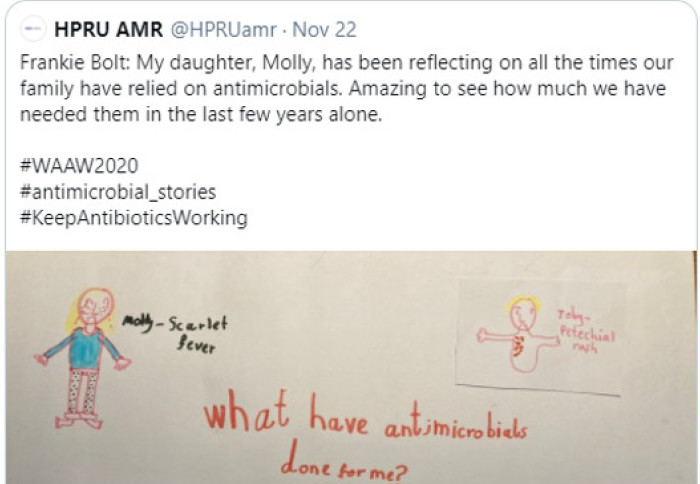Raising Awareness of AMR during lockdown

#Antimicrobial_stories from Frankie Bolt
World Antimicrobial Awareness Week was marked by NIHR Health Protection Research Unit in HCAIs and AMR with a webinar, social media campaign & video.
18 – 24 November was World Antimicrobial Awareness Week (WAAW). This WHO initiative aims to increase awareness of global antimicrobial resistance (AMR) and to encourage best practices among the general public, health workers and policy makers to avoid the further emergence and spread of drug-resistant infections.
Traditionally, our Health Protection Research Unit has held an Antibiotic Amnesty across our College campuses accompanied by a number of pop-up stands with fun activities as part of our Patient and Public Engagement. The global pandemic this year, obviously required a different approach, leading to the development of an online webinar for students globally and the filming of a short video by staff as part of a social media campaign encouraging people to reflect on what antimicrobials have meant to them.
The webinar “United to preserve antimicrobials” attracted over 80 participants from 8 countries and featured Dr Diane Ashiru-Oredope, Pharmacist Lead for Antimicrobial Resistance and Stewardship at Public Health England and speakers from South Africa, India, Chile and Pakistan. Presentations on health literacy, knowledge mobilisation and antimicrobial stewardship around the world, were complimented by powerful personal messages including that of Ms Vanessa Carter, Africa CDC Civil Society Champion for AMR who was winner of the Community Communications category at the Antibiotic Guardian 2020 Shared Learning event led by Public Health England. The award recognised Vanessa's powerful social media campaign promoting antibiotic resistance advocacy and stewardship.
Meanwhile, in a more light-hearted approach to raising awareness, our video and media campaign featured the children of staff from the HPRU, asking Monty Python style; “What have antimicrobials ever done for us anyway?”. The tweet, with accompanying video (https://www.youtube.com/watch?v=gRpM_yef3vA) was seen over 28,000 times and retweeted by NIHR Research, ECDC and MRSA Action. Viewers were encouraged to share what antimicrobials had done by them using the hashtag #antimicrobial_stories.
Honours for Dr Esmita Charani
The Unit is delighted, that Dr Esmita Charani, Lead Research Pharmacist from our first HPRU and Research Lead for the Practice, Design and Engineering theme of our second, has been showered with recognition this year.
In May Esmita was nominated and elected, to the European Society of Clinical Microbiology and Infectious Diseases (ESCMID) Study Group for Antimicrobial stewardship (ESGAP) executive committee.
In July, Esmita’s application to the Hamied Foundation UK-India AMR Visiting Professorships fellowship was successful. The prestigious scheme supports the travel and subsistence costs of UK researchers wishing to visit India to develop long-term collaborations in this highly important and topical field of biomedical research. The programme will see Esmita undertake a lecture tour across three sites; the Amrita Institute of Medical Sciences (AIMS) hospital in Kerala, the new AIMS “mega hospital” in Delhi and the Postgraduate Institute of Medical Education and Research Chandigarh.
This was followed in November, by Esmita's nomination as a fellow of the Royal Pharmaceutical Society for her distinction in the profession of Pharmacy. The fellowship is only awarded to members who have made an outstanding original contribution to the advancement of pharmaceutical knowledge or attained distinction in the science, practice, profession or history of pharmacy.
Finally, in December, in recognition of her ongoing excellent work as part of the ASPIRES project (Antibiotic use across Surgical Pathways - Investigating, Redesigning and Evaluating Systems), Esmita was made an Honorary Associate Professor in the Department of Medicine at the University of Cape Town.
Welcome Dr Paul Arkell
Mid-November we welcomed Dr Paul Arkell, Clinical Research Fellow who joined the CAMO team. Paul studied undergraduate medicine at the University of Birmingham Medical School. Since graduating in 2010 he has worked as a junior doctor in Stoke-on-Trent and then London. He is now a Specialist Registrar (ST5) in Infectious Diseases and Microbiology. He has a keen interest in tropical infection and has worked in hospitals and clinical laboratories in Sierra Leone, Malaysia and Timor-Leste. Paul's research interest is in the use of point-of-care technologies for diagnosis, management and surveillance of acute febrile illness
Article text (excluding photos or graphics) © Imperial College London.
Photos and graphics subject to third party copyright used with permission or © Imperial College London.
Reporter
Rakhee Parmar
Department of Infectious Disease
